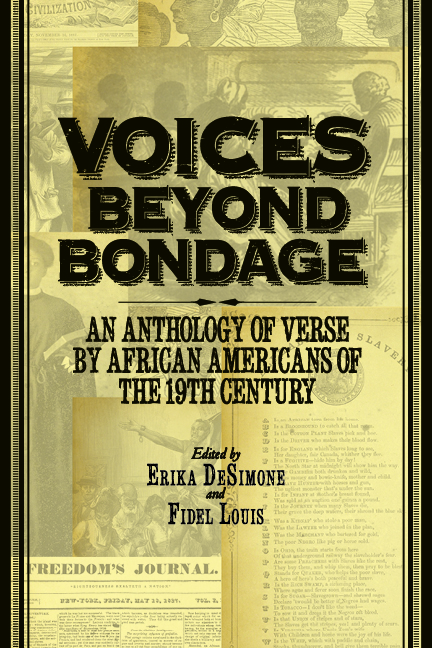 Voices Beyond Bondage: An Anthology of Verse by African Americans of the 19th Century, which seeks to reveal the largely unknown literary heritage of enslaved and free African Americans of that era, received prominent coverage recently with an Associated Press article and a discussion on the Tavis Smiley radio show.
Voices Beyond Bondage: An Anthology of Verse by African Americans of the 19th Century, which seeks to reveal the largely unknown literary heritage of enslaved and free African Americans of that era, received prominent coverage recently with an Associated Press article and a discussion on the Tavis Smiley radio show.
The book, edited by Erika DeSimone and Fidel Louis, reprints 150 poems originally published in nineteenth-century black-owned newspapers, which often held open calls for poetry submissions. The recognition of this poetry helps to bring greater depth to the identity of these nineteenth-century African Americans, an identity that has been largely subsumed in popular history by the atrocities of slavery.
“The way history portrays African Americans in the nineteenth-century is really inaccurate,” DeSimone told Tavis Smiley in a recent interview. “It occurred to me that there’s really something valuable here, there’s really something that’s missing from the literary canon.”
Smiley asked DeSimone who the authors of the poems were, and DeSimone explained that they were ministers and abolitionists, “but overall these are people we haven’t heard from, these are people whose voices have not been recorded anywhere outside of these newspapers.” DeSimone added that “reading among slaves was not as uncommon as we think,” and that an estimated ten percent of slaves were literate.
Among those literate slaves was George Moses Horton, spotlighted in Jesse Holland’s Associated Press review of Voices Beyond Bondage, picked up by the ABC News and diverse newspapers serving diverse communities from Delhi, India, to Calgary, Canada. “As a black slave in rural North Carolina in the pre-Civil War South, [Horton] … wasn’t supposed to be able to compose sonnets and ballads,” Holland writes, “But on July 18, 1828, his poem ‘Slavery’ appeared in the newspaper Freedom’s Journal.” According to DeSimone, Horton would “compose poems — beautiful, complex, lush, poems — in his head and have others write them down. In fact, he’d recite these poems and sell them near [the University of North Carolina]; students paid good money to have poems ‘written’ for their girlfriends.”
Another poet in the book, Holland mentions, is John Willis Menard, a newspaper publisher, the first African American elected to the House of Representatives, and the first African American to address Congress.
The various sections in the anthology include poems about freedom, dedications to others, moral and civic perspectives, nature poems, and humor. Smiley asked, “What did black folk find humorous [back then],” and DeSimone gave as examples a “nonsense” poem, a poem decrying the hot weather, and a poetic tale of misguided lovers.
Holland concludes, “DeSimone and Louis’ work expands the field of black poetry, disproves the myth that nineteenth-century African Americans were illiterate or uneducated, and should be a welcome addition to any historian or poetry lover’s library.”
Read Jesse Holland’s “Review: ‘Voices Beyond Bondage’ expands the field of black poetry” online. You can also listen to the Tavis Smiley Show interview with Erika DeSimone from the show’s website..
Voices Beyond Bondage: An Anthology of Verse by African Americans of the 19th Century is available from NewSouth Books, Amazon, or your favorite bookstore.
